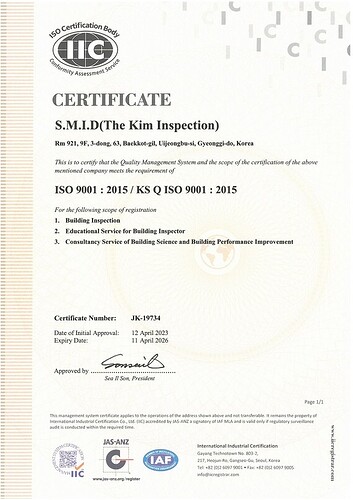The Kim Inspection, a Home & Building inspection and inspector training company in South Korea, has earned ISO certification, the standard for all industries and activities.
The scope of certification is ISO 9001 (quality management system) and ISO 14001 (environmental management system), which covers * Building Inspection * Educational Services for Building Inspector * Consultancy Service of Building Science and Building Performance Improvement.
What is ISO certification?
ISO certification is a seal of approval from a third-party body that a company runs to one of the international standards developed and published by the International Organization for Standardization (ISO).
The ISO are an independent, non-governmental international organization who brings together experts to share knowledge and develop international standards that support innovation and provide solutions to global challenges.
ISO certification shows your key stakeholders that you have a well-run business that has structure, is stable and ready for growth.
Each ISO standard has its own benefits, for example:
- [ISO 9001] helps put your customers first
- [ISO 27001] protects your systems, data and reputation
- [ISO 14001] reduces your environmental impact
- [ISO 45001] helps you protect your people
- [ISO 22301] protects your business from disruption
Considering ISO certification for your home inspection business? Reach out to Kim Jungirl for advice on navigating the process.

